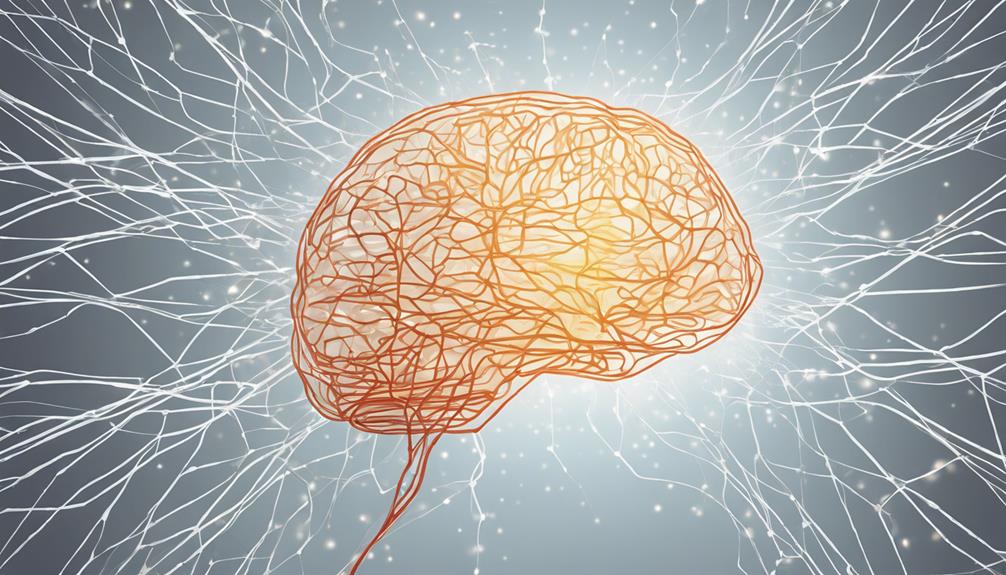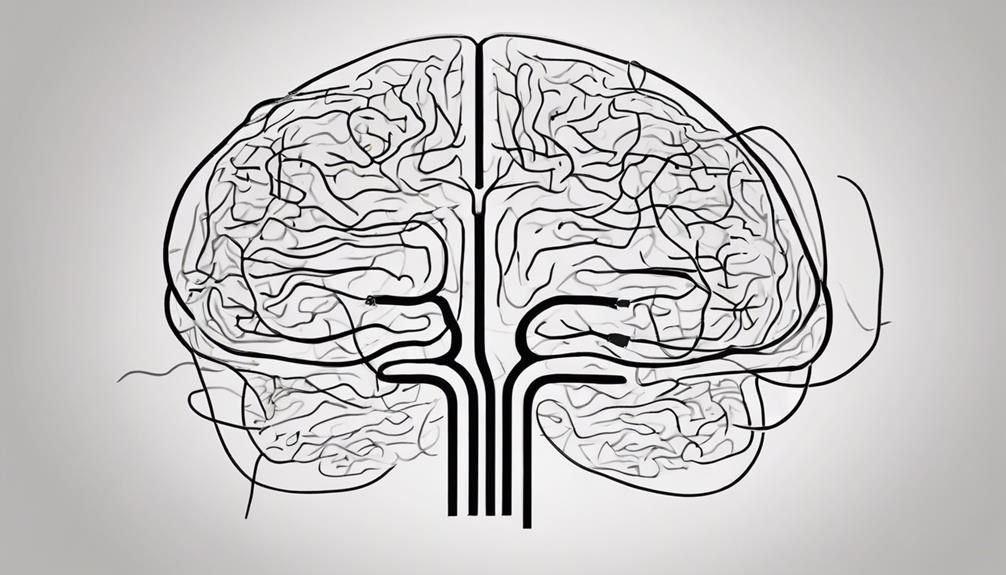The power of the human mind is a subject that continues to intrigue scientists and researchers across disciplines. From the intricate processes of memory formation to the profound impact of emotions on decision-making, the capabilities of our minds are vast and complex. Neuroplasticity, the brain's ability to rewire itself, opens up a world of possibilities for personal growth and cognitive enhancement. However, the true extent of the human mind's power remains a mystery waiting to be unraveled through further exploration and understanding of its inner workings.
Key Takeaways
- The human mind holds immense potential with 70,000 daily thoughts and neuroplasticity for adaptability.
- Memory encoding through acoustic, visual, and semantic processing enhances cognitive abilities.
- Techniques like meditation and visualization unlock hidden potentials for personal growth and empowerment.
- The mind-body connection influences healing outcomes, showing the power of the mind in well-being and recovery.
The Brain's Incredible Processing Abilities

The human brain's unparalleled processing capabilities, driven by its intricate neural network and astonishing speed, form the foundation of its remarkable cognitive prowess. With the ability to process about 70,000 thoughts per day, the brain showcases its immense power in handling complex cognitive tasks. This processing power is fueled by over 86 billion neurons and trillions of synapses, enabling functions such as memory consolidation, learning, decision-making, and problem-solving.
Additionally, the brain's energy-efficient nature is evident as it can generate up to 23 watts of power, comparable to the energy needed to illuminate a light bulb. Neuroplasticity, another crucial aspect, allows the brain to adapt and reorganize itself by forming new neural connections, emphasizing its flexibility and capacity for learning throughout life. Moreover, the brain's processing speed is remarkable, with neurons firing at speeds up to 120 meters per second, facilitating rapid information processing and swift response times. This intricate combination of power, neuroplasticity, and processing speed underscores the brain's extraordinary abilities in shaping human cognition.
Memory Formation and Retrieval Mechanisms
Memory formation and retrieval mechanisms are fundamental processes in understanding the power of the human mind. The encoding process involves the establishment of neural connections, while retrieval hinges on cues activating stored information. Exploring forgetting and interference mechanisms further enriches our comprehension of memory dynamics.
Memory Encoding Process
During the process of memory encoding, sensory information undergoes a complex transformation to facilitate storage and subsequent retrieval. This process involves the progression of information from sensory memory to short-term memory and eventually into long-term memory. Various encoding mechanisms, such as acoustic, visual, and semantic processing, are employed to create lasting memory traces. Acoustic encoding involves the encoding of sounds, while visual encoding involves the encoding of images. Semantic encoding, on the other hand, involves processing the meaning of information. These mechanisms work together to facilitate the consolidation of memories for long-term storage. Understanding the intricate process of memory encoding sheds light on how information is retained and retrieved in the human mind.
Retrieval Cues Importance
In the intricate web of memory processes, the significance of retrieval cues emerges as a critical element in facilitating memory formation and retrieval mechanisms. Retrieval cues serve as triggers that enable access to stored information in the mind, enhancing memory recall by activating related experiences. Different types of cues, such as contextual, emotional, and associative cues, play a crucial role in this process. Understanding the importance of retrieval cues can significantly improve memory performance and learning outcomes. By recognizing the role these cues play in connecting stored memories with present experiences, individuals can harness the power of their mind to optimize memory formation and retrieval for enhanced cognitive abilities.
Forgetting and Interference Mechanisms
Interference mechanisms in memory formation and retrieval processes play a pivotal role in understanding the complexities of forgetting and memory recall. Forgetting can occur due to interference from similar memories or new information displacing old memories. Two key types of interference are retroactive interference, where new information disrupts the recall of older memories, and proactive interference, where old memories hinder the retrieval of new information. By comprehending these interference mechanisms, strategies can be developed to enhance memory retention. Understanding how interference impacts memory recall is fundamental in devising effective memory recall techniques.
| Interference Mechanisms | Description |
|---|---|
| Retroactive Interference | New information disrupts the recall of older memories |
| Proactive Interference | Old memories hinder the retrieval of new information |
The Influence of Emotions on Decision-Making
Emotions play a significant role in decision-making processes, often steering individuals towards choices that may not align with pure logical reasoning. This emotional influence can lead to impulsive decisions, impacting the overall outcomes of such choices. Understanding the dynamics between emotions and rational thinking is crucial for unraveling the complexities of human decision-making.
Emotions and Choices
The intricate interplay between human affective states and cognitive processes profoundly shapes the landscape of decision-making mechanisms. Emotions heavily influence decision-making processes by shaping perceptions and biases, often leading individuals to make choices based on feelings rather than logic. Emotional responses have the power to override rational reasoning, impacting the quality of decisions made. Neuroscientific studies provide evidence that emotions play a significant role in guiding decision-making, shedding light on how our emotional state can sway the outcomes of choices. Moreover, emotions can influence risk-taking behavior and the assessment of potential results, highlighting the necessity of understanding one's emotional state to facilitate sound and rational decision-making processes.
Rational Vs. Emotional
Numerous empirical studies have consistently demonstrated the profound impact of emotional factors on the decision-making processes of individuals. Emotions, often more potent than rational thinking, can lead to impulsive decisions that deviate from logical reasoning. Research suggests that emotions can hijack neural pathways involved in decision-making, potentially overriding rational considerations. Individuals with higher emotional intelligence can better navigate this interplay between emotions and rationality, striking a balance in decision-making. Understanding how emotions influence decision processes is vital for enhancing overall decision quality. By acknowledging the significant role emotions play in shaping choices, individuals can develop strategies to mitigate impulsive decisions and leverage emotional cues to make more informed and balanced judgments.
Neuroplasticity and Brain Rewiring

Through the process of neuroplasticity, the human brain demonstrates remarkable adaptability by reorganizing neural connections in response to learning, experiences, and environmental stimuli. This ability to rewire the brain plays a fundamental role in shaping cognitive functions, memory formation, and recovery from brain injuries. Here are four essential aspects related to neuroplasticity and brain rewiring:
- Continuous Neural Reorganization: Neuroplasticity allows for the formation of new neural connections throughout life, enabling the brain to adapt to changing circumstances and learn new information constantly.
- Learning and Environmental Influence: Brain rewiring occurs through experiences, learning, and exposure to various environmental factors, highlighting the dynamic nature of neural connections.
- Strengthening Neural Pathways: Practice and repetition play a crucial role in reinforcing neural pathways, facilitating efficient information processing and skill acquisition through the strengthening of specific connections.
- Role in Recovery and Adaptation: Neuroplasticity is instrumental in recovery from brain injuries and neurological disorders, showcasing the brain's remarkable ability to adapt, learn new skills, and overcome challenges through rewiring processes.
The Subconscious Mind's Hidden Powers
The subconscious mind, operating beneath the surface of conscious awareness, wields a profound influence on our thoughts, behaviors, and decisions. Understanding and harnessing the hidden powers of the subconscious mind can unlock untapped potentials within ourselves. By exploring techniques such as hypnosis or visualization, we can tap into this reservoir of hidden potential for personal growth and transformation.
Subconscious Mind's Influence
Unbeknownst to many, the subconscious mind wields immense influence over our daily actions and decisions, operating at a staggering pace of 400 billion bits per second. Here are some key points highlighting the subconscious mind's impact on our behaviors and beliefs:
- Automatic Responses: The subconscious mind controls 95% of our actions without conscious awareness.
- Memory Storage: It stores memories, beliefs, emotions, and habits that shape our behaviors.
- Reality Perception: Our subconscious influences how we perceive reality and filters incoming information.
- Reprogramming for Growth: By reprogramming the subconscious mind, we can change ingrained patterns, leading to personal growth and transformation.
Understanding and harnessing the power of the subconscious mind is crucial for achieving personal development and self-improvement.
Harnessing Hidden Potentials
Harnessing the hidden potentials of the subconscious mind involves delving into the depths of our cognitive processes to unlock innate abilities and enhance personal growth. The subconscious mind, processing over 400 billion bits of information per second, significantly influences our thoughts and behaviors. Techniques such as meditation, hypnosis, visualization, and positive affirmations play crucial roles in tapping into these hidden powers. By utilizing these methods, individuals can access intuition, enhance creativity, improve problem-solving skills, and even recall past memories. With subconscious programming affecting 95% of our daily lives, understanding and harnessing its potentials can lead to significant personal development, goal achievement, and overall well-being. Embracing these practices allows individuals to empower themselves by unlocking the vast capabilities residing within their subconscious minds.
Telepathy and Mind-to-Mind Communication

Through rigorous examination and controlled experimentation, the phenomenon of telepathy, or mind-to-mind communication, has garnered attention as a potential avenue for non-verbal interaction between individuals. Studies suggest that telepathy allows the transmission of thoughts, feelings, or mental images without conventional sensory input. Research has delved into telepathic experiences across anecdotal reports and controlled laboratory environments, highlighting the prospect of non-verbal communication between minds. Some individuals report telepathic connections predominantly with close associates like family or friends, indicating a unique bond that facilitates intuitive communication beyond standard means. Controlled experiments investigating telepathy often employ sender-receiver setups, where one individual mentally transmits information while another endeavors to receive or perceive it, showcasing the plausibility of mind-to-mind communication. While scientific circles debate telepathy, the persistence of anecdotal evidence and personal testimonies sustains interest in the potential for unspoken communication among minds.
Exploring Lucid Dreaming and Astral Projection
The exploration of lucid dreaming and astral projection offers intriguing insights into the realms of consciousness and inner exploration. Lucid dreaming involves the awareness that one is dreaming while in the dream state, allowing individuals to actively participate and manipulate their dreams. Techniques such as reality checks and maintaining dream journals can aid in improving the frequency and control of lucid dreams.
On the other hand, astral projection is the concept that one's consciousness can separate from the physical body, enabling travel to different planes of existence. Practitioners often report out-of-body experiences where they perceive the physical world from a non-physical vantage point.
Both lucid dreaming and astral projection provide unique opportunities to delve into the depths of the mind and explore the expanses of consciousness beyond our waking reality. By engaging in these practices, individuals can push the boundaries of what is known and challenge the conventional understanding of the human mind.
Mindfulness Meditation and Brain Health

Utilizing mindfulness meditation has been increasingly recognized for its significant impact on enhancing brain health through various neurological mechanisms.
- Mindfulness meditation has been shown to increase gray matter in brain regions associated with memory, learning, and emotional regulation. This increase in gray matter can lead to improved cognitive functions and emotional well-being.
- Regular practice of mindfulness meditation can reduce the size of the amygdala, the brain's stress center. By decreasing the size of the amygdala, individuals may experience reduced anxiety levels and enhanced emotional regulation.
- Studies have demonstrated that mindfulness meditation can enhance cognitive functions such as attention, focus, and decision-making by promoting neuroplasticity. This improvement in cognitive functions can have a positive impact on various aspects of daily life.
- Mindfulness meditation has been linked to decreased activity in the default mode network (DMN), which is responsible for mind-wandering and self-referential thoughts. By reducing DMN activity, individuals may experience increased present-moment awareness and focus.
The Quantum Mind: Consciousness and Reality
Exploring the intersection of consciousness and reality through the lens of quantum mind theory challenges conventional understandings of the human mind's role in shaping perception and the nature of existence. Quantum mind theory posits that consciousness is not merely a byproduct of brain activity but a fundamental component of reality itself. In the realm of quantum mechanics, consciousness is believed to influence the collapse of wave functions, suggesting a deep connection between the observer's mind and the external world. The observer effect in quantum physics further emphasizes this link, demonstrating how observation can lead to tangible changes in the fabric of reality.
Moreover, some interpretations propose that consciousness transcends the confines of the brain, extending into the environment and beyond. This perspective implies that our minds are not isolated entities but rather interconnected with the world around us, shaping and being shaped by our surroundings. By challenging traditional views on consciousness and reality, the quantum mind theory opens up new avenues for understanding the profound relationship between the mind, perception, and the nature of existence.
Enhancing Cognitive Performance and Focus

Enhancing cognitive performance and focus is essential for optimizing productivity and overall brain function in daily activities. To achieve this, individuals can employ various techniques and habits that have been scientifically proven to enhance cognitive abilities:
- Mindfulness Meditation: Practicing mindfulness meditation has been linked to improvements in attention, focus, and cognitive flexibility. This technique involves training the mind to stay present and attentive, which can enhance overall cognitive performance.
- Brain Training Exercises: Engaging in brain training exercises, such as puzzles, memory games, or cognitive training programs, can help sharpen cognitive skills, improve memory retention, and boost overall focus and mental clarity.
- Physical Exercise: Regular physical exercise has been shown to have numerous cognitive benefits, including improved focus, memory, and cognitive function. Exercise increases blood flow to the brain, promotes neurogenesis, and supports overall brain health.
- Adequate Sleep and Balanced Diet: Ensuring an adequate amount of quality sleep and consuming a balanced diet rich in nutrients like omega-3 fatty acids and antioxidants are crucial for optimal cognitive performance and sustaining focus throughout the day. Proper nutrition and rest provide the brain with the energy and resources it needs to function at its best.
The Mind-Body Connection in Healing
The intricate interplay between the mind and body plays a pivotal role in influencing healing outcomes, notably through mechanisms like the placebo effect. Placebos, often in the form of inert pills, can elicit a powerful response from the body, triggering the release of neurotransmitters like serotonin that help alleviate symptoms such as depression. Studies have shown that placebo treatments have led to cure rates varying from 15% to 72% across a spectrum of health conditions. This phenomenon underscores the significant impact of the mind-body connection on overall well-being and recovery.
| Key Points | Impact |
|---|---|
| Placebo Effect | Triggers release of serotonin for symptom relief |
| Power of Human Mind | Influences healing outcomes significantly |
| Healing Outcomes | Linked to the brain's anticipation of results |
Understanding the mind-body connection can open new avenues for exploring the potential of placebo interventions in healthcare, offering insights into how the human mind possesses the capacity to influence physiological responses for better health outcomes.
Harnessing Intuition and Gut Feelings

Utilizing rapid, subconscious judgments rooted in past experiences and patterns, harnessing intuition and gut feelings can significantly impact decision-making processes. When it comes to trusting your intuition, there are several key points to consider:
- Subconscious Judgments: Intuition and gut feelings are often based on subconscious assessments of information gathered over time, allowing for quick decision-making without explicit reasoning.
- Quick Insights: Gut feelings can provide rapid insights and solutions to problems, bypassing the need for lengthy deliberation or conscious analysis.
- Research Support: Studies indicate that intuition plays a vital role in effective decision-making and problem-solving, suggesting that it is a valuable tool to cultivate.
- Enhanced Decision-Making: By honing your ability to recognize and trust your intuition, you can improve your decision-making skills, leading to better outcomes and more informed choices.
Limitless Potential: Mind Over Matter
In exploring the concept of mind over matter, scientific inquiry delves into the potential of the human mind to influence physical reality through cognitive processes. The ability of the human mind to alter the molecular structure of objects through thought force has been exemplified by individuals like Saint Ramalingam. This phenomenon suggests that the mind possesses a power that extends beyond conventional understanding, allowing for manipulation at a fundamental level.
Moreover, great scientists throughout history have demonstrated the capacity to use their minds to make groundbreaking discoveries that transcend ordinary sensory perceptions. This highlights the profound influence that the mind can have on material existence when harnessed effectively. Additionally, the human mind's connection to the universal mind provides individuals with the opportunity to tap into vast knowledge and understanding that surpasses individual limitations.
Cultivating a calm and quiet mind, devoid of desires, is regarded as the pinnacle of achievement in harnessing the mind's power. This state of mind enables individuals to unlock the full potential of mind over matter, facilitating remarkable feats and insights that would otherwise remain inaccessible.
Frequently Asked Questions
What Is the Secret Power of the Human Mind?
The secret power of the human mind lies in its ability for mind control, telepathic communication, psychic abilities, manifesting desires, and intuitive insights. Through focused intention and mental discipline, individuals can harness these capabilities to influence their reality and tap into higher levels of consciousness. Understanding and unlocking the full potential of the mind can lead to profound personal growth and spiritual evolution, allowing individuals to transcend limitations and connect with universal wisdom.
What Power Does the Mind Have?
The mind holds immense power through its brain waves, mental strength, cognitive abilities, mind over matter, neuroplasticity, and cognitive control. It influences perceptions, decisions, and actions. Harnessing this power can lead to significant achievements and discoveries. Understanding the mind's capabilities is crucial for unlocking its full potential and achieving personal and professional success. Through focused attention and mental discipline, individuals can tap into the vast reservoir of power that lies within their minds.
What Are the Three Abilities of Our Mind?
The human mind possesses remarkable abilities that include creative imagination, critical thinking, problem-solving skills, emotional intelligence, and memory retention. Creative imagination allows for innovative thinking and the generation of new ideas. Critical thinking enables logical reasoning and the evaluation of information. Problem-solving skills aid in finding solutions to complex challenges. Emotional intelligence helps in understanding and managing emotions effectively. Memory retention allows for the storage and retrieval of information for various cognitive tasks.
What Is the Most Powerful Thing About Mind?
The most powerful aspect of the mind lies in its creative potential, which gives rise to limitless imagination, cognitive abilities, problem-solving skills, and emotional intelligence. These attributes collectively enable the mind to shape perceptions, drive actions, and influence outcomes. Understanding and harnessing this inherent power can lead to profound personal growth, success, and overall well-being. In essence, the mind's capacity to innovate, adapt, and transform is its greatest strength.
Conclusion
In conclusion, the human mind is akin to a boundless ocean, with depths yet to be fully explored and understood. Its intricate neural networks, memory mechanisms, and emotional influences paint a vivid picture of its immense power. Through neuroplasticity, subconscious capabilities, and mind-body connections, the mind holds the key to unlocking limitless potential. By harnessing intuition and cognitive abilities, individuals can navigate the vast seas of the mind to achieve success and well-being.
